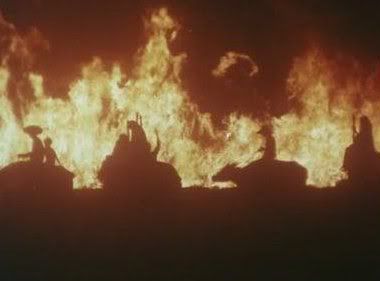Cosette.
Certainly the most visually stunning film of the year, "Les Misérables" is no doubt a musical picture of epic proportions that's passionately held together by numerous powerful performances. Running close to 3 hours, the film is indeed a cinematic dream come true for musical fans, but may also prove to be quite an extensive chore to watch for non-musical lovers. In a way, the song numbers may often tend to delay the film's otherwise smooth narrative progression, which is truly a proof of how musicals are more focused on prioritizing moods, emotions and internal turbulence rather than the stories themselves. As a song number ends and another one begins, I can't help but notice the audience's numerous laughs of disbelief as they uncomfortably twitch and readjust in their seats. "Les Misérables", despite its all-star cast and visual spectacle, is indeed not for everyone. But nonetheless, it's still powerful stuff, with Anne Hathaway and Hugh Jackman leading the way.
Peter Greenaway, a visionary independent filmmaker, has once suggested that film adaptations (specifically Jane Austen's) are nothing but wastes of time. This statement may prove to be quite apt to this recent cinematic incarnation of "Les Misérables", but there's something in this Tom Hooper-directed version that is just quite transcendent to behold. One of them, quite naturally, is the performances, which were all elevated by a sense of both larger-than-life romanticism and subtle humanity. But the one who has really moved me close to tears is Anne Hathaway's performance as Fantine. Enhanced by the film's stylistic preference of capturing the song numbers in stark close-up shots (quite reminiscent of Carl Theodor Dreyer's "The Passion of Joan of Arc") rather than in flowing camera movements, Ms. Hathaway has delivered what may be the best performance of the year and the greatest of her career so far. Honestly, her rendition of "I Dreamed a Dream" is just so emotionally perfect and devastatingly heart-breaking that even at this very moment while writing this review, I'm still having some goose bumps. With echoes of Maria Falconetti in her performance, Anne Hathaway, despite her short screen time, has proven that although Jean Valjean's (Hugh Jackman) path to redemption is the real focus of "Les Misérables", it was her Fantine that is the anchoring soul of the film. I'm not exaggerating here or anything, but I do think that Anne Hathaway's "I Dreamed a Dream" scene is already worth the price of admission alone.
But as expected, Hugh Jackman, whose resume boasts of a Tony award, is also pitch perfect in the role of Jean Valjean, who's just effortless in his embodiment of the character's rapid emotional transitions, usually from emotional fury to silent gentility and then back again. But let's not also forget Russell Crowe in the very complex role of Javert, who is very believable in his portrayal of the said character's adherence to both blind justice and pure conviction. Although his voice, as what other people complain about, quite lacks the power and range needed for such a crucial character, his facial expressions and imposing presence more than makes up for it. There's also the film's sleeper performance in the form of Samantha Barks' Eponine, who just shined in the role, especially in her "On My Own" number. On the other hand, Sacha Baron Cohen and Helena Bonham Carter, although in their usual element, never quite did it for me because, well, they're just too humorously ho-hum in their roles.
Admittedly, "Les Misérables" is a film that's quite dated in its themes and very derivative in its revolutionary spirit. But nonetheless, it was still able to connect with me on a very nationalistic level specifically because of its numerous parallels with Jose Rizal's (Philippines' National Hero) "Noli Me Tangere" and "El Filibusterismo". As the film reaches its final crescendo and as the screen goes to black, it's as if I've watched an actual West End production, but this time with all of "Les Misérables'" 'sound and fury' magnified a hundredfold. "Les Misérables", an emotionally overwhelming musical film, is a textbook example of how stunning the marriage of stage and film can be when done right.
FINAL RATING












